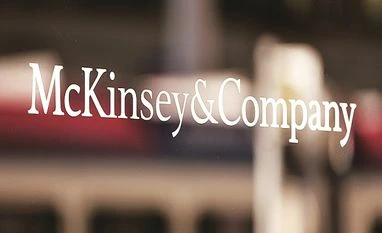Global consulting firm McKinsey and Company will advise steel and wire rope maker Usha Martin. The board of the debt-laden company, which includes a State Bank of India (SBI) nominee, recently cleared the appointment of the consultant for the one-year assignment.
"We are getting McKinsey to help us with operational efficiency and reduction in costs to improve profitability of our steel business," Rohit Nanda, chief financial officer, Usha Martin, told Business Standard. McKinsey would work on the speciality steel business of the company in two phases.
The first phase, which would last around six to eight weeks, would comprise a techno-economic viability (TEV) study where the consultant would understand the technical and financial aspects and identify areas for improvement. At the implementation stage, McKinsey would help the company achieve operational efficiency through various technical measures, which may include tweaking processes.
The company has 4,300 employees, with another 600 on contracts. Executives said the McKinsey plan is unlikely to have any impact on jobs. Usha has around Rs 5,000-crore debt, and has had a skirmish with lenders a couple of months ago.
To find buyers for its wire ropes business, valued at Rs 2,500 crore, Usha has already appointed Royal Bank of Canada, which specialises in deals in this segment. The business is likely to draw interest of Tokyo Rope and WireCo WorldGroup. Financial investors like private equity funds are said to have shown interest.
In an unprecedented move in April, lenders led by SBI, which accounts for close to half of the loan exposure, moved a resolution to remove Prashant Jhawar from the position of chairman after alleged delay in executing the pledge of his personal holding to secure additional facilities from the lenders.
Though both major businesses — steel and wire ropes — were Ebitda-positive, the company reported a net loss of Rs 357.6 crore for the financial year ended March 2017 on a consolidated basis. Ebitda is earnings before interest, tax, depreciation, and amortisation. Interest costs stood at Rs 564 crore, largely on account of long-term debt raised to fund capital expenditure plan that began in 2010-11. Volatility in coking coal prices has not helped.
In a June 6 report giving a negative outlook on the company's debt, India Ratings said the increase in coking coal prices may impact operating profits. "The negative outlook reflects the likelihood of a negative impact on the company's profitability margins due to surge in coking coal price to around $290 per tonne in November 2016 from the low levels of around $75 per tonne."
The rating agency added, "However, according to management, the company planned to change the input mix in steel making to use more of sponge iron and reduce the proportion of hot metal along with reducing the sale of coke and billets to reduce the consumption of coking coal by around 50 per cent. Further, the company has been negotiating with its customers for an increase in price, which if does not happen, will lead to a significant decline in Ebitda and interest-servicing capability."
India Ratings said asset sale would be key to meeting the shortfall in refinancing, outlining the tight deadlines coming up. The company has repayment of around Rs 551 crore in FY18, of which it has tied up for Rs 274 crore and expects sanction of Rs 180 crore from one bank leading to a shortfall of Rs 97 crore. "The shortfall is due to lower-than-expected tie-up from banks of around Rs 315 crore (including expected sanction). The shortfall is likely to be met through expected sale proceeds of Rs 131 crore from non-core asset and mining compensation of Rs 171 crore for the coal mine deallocated in FY15, according to a Supreme Court order; however, final amount is yet to be finalised," the India Ratings report said, adding, "any delay in tie-up of balance funds or delays in receipt of the proceeds from the sale of non-core assets beyond June 2017 and/or inability to improve the Ebitda margins over the next two quarters, indicating further stress on cash flow, will result in a rating downgrade."
Some analysts are not convinced of the plans to sell the wire ropes business for which Usha Martin is known globally. "The plan to revive steel business is like throwing good money after bad. They are persisting with their own folly that began in 2011. How are the banks agreeing to this?" asked an analyst who has tracked the company.
In 2010, Usha Martin decided to take up capital expenditure to increase its steel-making capacity to 1 m tpa with a pellet plant thrown in. This was justified as a de-risking measure to protect what was then the company's main business, wire ropes.
But, the decision backfired with the structural downturn in the steel market and volatile pellet prices. Also with several new players such as JSW bringing in huge capacities backed by modern technology, Usha Martin's expansion plans seemed too little too late.
The management view seems to hinge on what is practical rather than what could have been. While the wire ropes business could still find buyers at reasonable, if not good valuations, the same is not the case with the steel segment. With several distressed assets in the sector already on the block, it might not fetch enough to reduce the debt burden in a meaningful way.
The company and the lenders seem to be banking on McKinsey to find a way out of this tight corner. A little turn in the market cycle could create some room for maneuver.
Unlock 30+ premium stories daily hand-picked by our editors, across devices on browser and app.
Pick your 5 favourite companies, get a daily email with all news updates on them.
Full access to our intuitive epaper - clip, save, share articles from any device; newspaper archives from 2006.
Preferential invites to Business Standard events.
Curated newsletters on markets, personal finance, policy & politics, start-ups, technology, and more.
)